one or two for the old commonplace book
I mentioned this in a post last night, or I suppose really very very early this morning, and now the post I said was coming is done (it took absolutely forever).
The following images are from England's Parnassus, a book of quotations published in 1600. According to EEBO the compiler's name is Robert Abbott, whom I assume is the "R.A." who signs off on the commendatory verse below. It's very interesting as a look at what sorts of things were Good Poetry from an Elizabethan POV, or at least one guy's POV. The most-represented poet as far as I could tell was Spenser, perhaps unsurprisingly, and there was also a very large showing from historically-minded poets like Michael Drayton and Samuel Daniel (my Sekrit Elizabethan Poet Boyfriend), and a lot from Joshua Sylvester and William Warner, whom you probably don't know much about unless you are a specialist.
Shakespeare, not surprisingly, is also well-represented, although what might be surprising, if I hadn't given it away in my previous post, is that nearly everything here comes from the narrative poems The Rape of Lucrece and Venus and Adonis. There are only five plays represented; roughly in order of number of appearances, they are Romeo and Juliet, Richard II, Richard III, 1 Henry IV, and Love's Labour's Lost. I am not sure how much of this is the result of privileging of narrative poetry over drama, and how much is a consequence of availability of printed texts.1 (It is notable that none of Shakespeare's sonnets, which weren't published until 1609, are quoted in England's Parnassus.)
Anyway, I am presenting to you all of the quotes attributed to Shakespeare in this collection (a few of which don't seem to actually be his), along with a couple of quotes by him but attributed to other people. (Weirdly, they're both from Richard II.) I've included the source of the quotations, along with the name of the speaker for quotes from the plays.
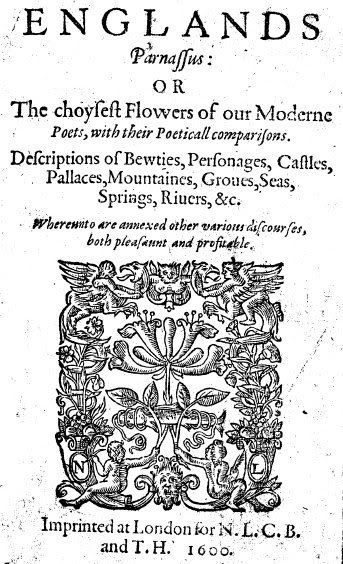
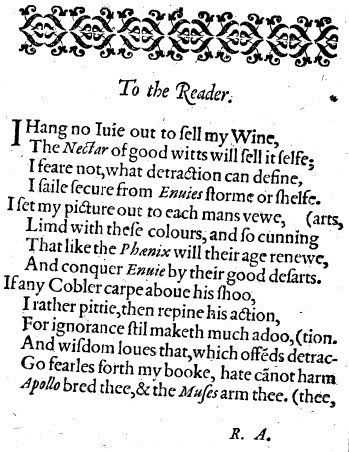
Angels

Richard II TLN 1469-70 (Richard)
Audacity
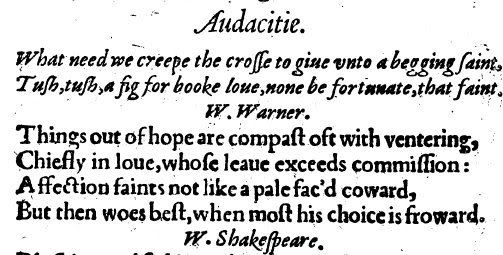
Venus and Adonis ll. 588-91
Avarice
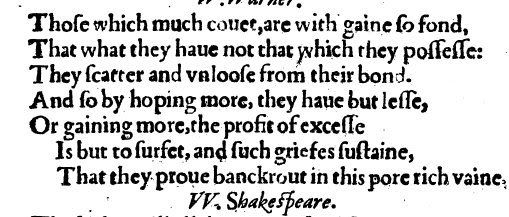
The Rape of Lucrece ll. 185-91
Beauty
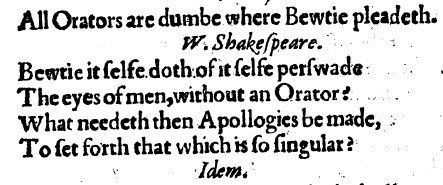
Lucrece l. 139; 80-81
Care

Romeo and Juliet TLN 1096 (Friar Laurence)
Danger

Venus and Adonis, l. 712
Death
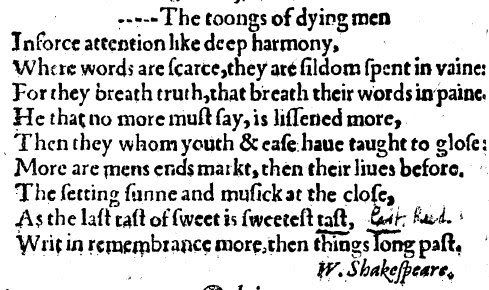
Richard II TLN 687-96 (John of Gaunt)
Delay

Richard III TLN 2783-84 (Richard)

I can't find a source for this; it may be a misattribution. There are a few of them in the anthology, as you will see.
Fear

Lucrece ll. 280-82
Gentleness

I can't find a source for this one either.
Gluttony

Love's Labour's Lost TLN 28-29 (Longaville)
Good Name

Richard II TLN 182-84 (Mowbray)
NB: All authoritative texts read "gilded loam."
Grief

Venus and Adonis ll. 1029-30
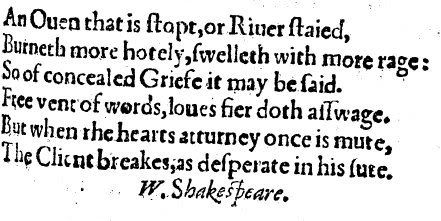
Venus and Adonis ll. 351-56

Romeo and Juliet TLN 2176-77 (Lady Capulet)

Lucrece l. 385
Haste

Another one I can't find.
Hope

Richard III TLN 3451-52 (Richmond)
Jealousy
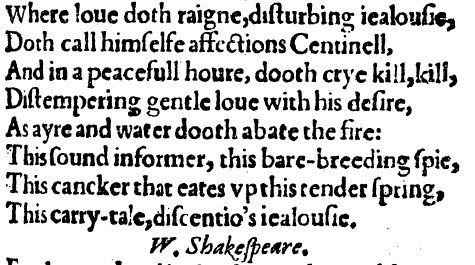
Venus and Adonis ll. 670-77
Justice

Lucrece l. 1738
Kings

Lucrece ll. 1065-66

Richard II TLN 1462-65 (Richard)

Lucrece ll. 658-60
Love
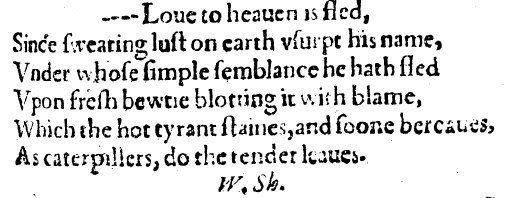
Venus and Adonis ll. 815-20

Venus and Adonis ll. 169-70
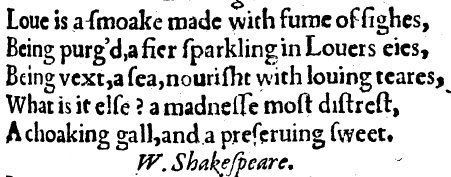
Romeo and Juliet TLN 217-21 (Romeo)
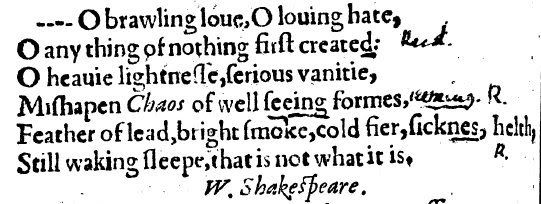
Romeo and Juliet TLN 200-05 (Romeo)
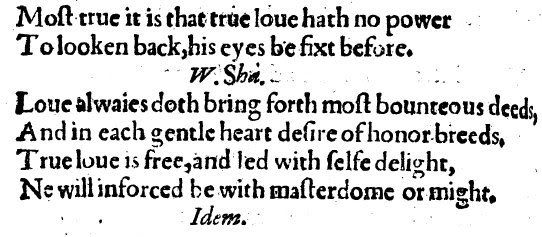
Two more I can't find.

Venus and Adonis, l. 43
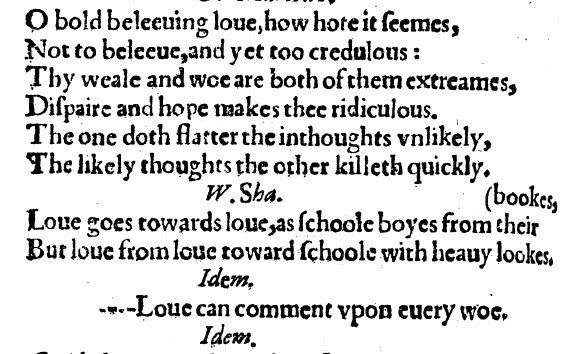
Venus and Adonis, l. 1007-12; Romeo and Juliet TLN 1014-15 (Romeo); Venus and Adonis l. 736
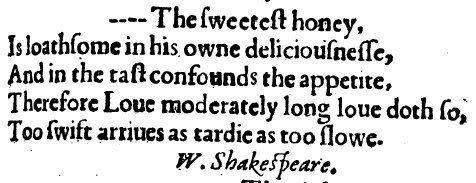
Romeo and Juliet TLN 1469-73 (Friar Laurence)

Lucrece l. 406
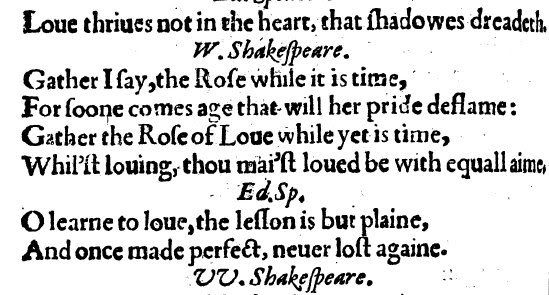
Lucrece l. 321; Venus and Adonis ll. 427-28

I can't find this one either.
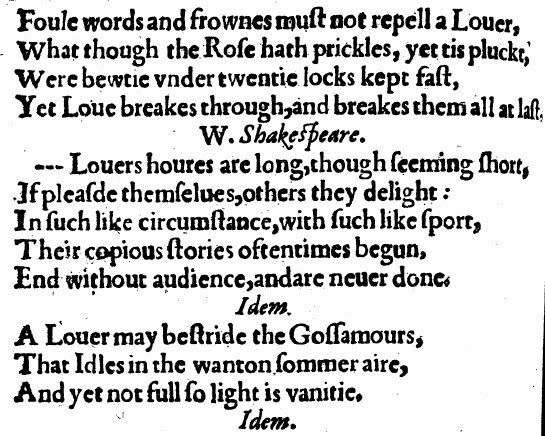
Venus and Adonis ll. 594-97, 864-68; Romeo and Juliet TLN 1476-78 (Friar Laurence)
Lust
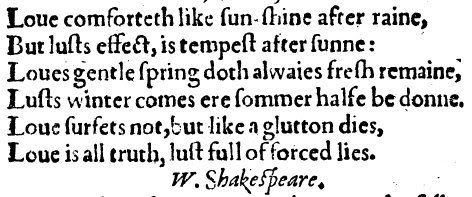
Venus and Adonis ll. 821-26

Lucrece ll. 752-58
Mercy

Lucrece l. 646; Romeo and Juliet TLN 1716 (Prince Escalus)
Misery

Venus and Adonis ll. 729-30
Nature

Lucrece ll. 589-90
Opportunity

Lucrece ll. 927-33
Pleasure

Love's Labour's Lost TLN 1724-25 (Berowne)
Princes
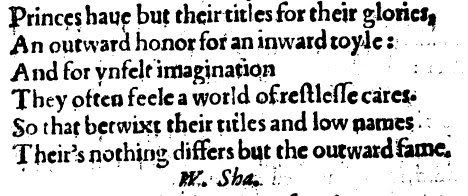
Richard III TLN 911-16 (Brakenbury)
Sorrow

Richard III TLN 909-10 (Brakenbury)

Richard II TLN 593-4 (John of Gaunt)
Note the misattribution to Edmund Spenser!
Tears

Lucrece l. 611
Thoughts

1 Henry IV TLN 3044-46 (Hotspur); Lucrece l. 404

Lucrece l. 139
Time

Lucrece ll. 976-80
NB: the first line should read "ugly night."
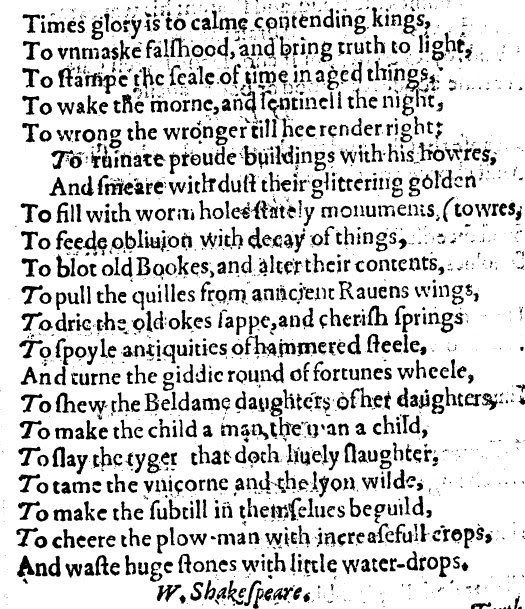
Lucrece ll. 990-1010
Treason

1 Henry IV TLN 2779-81 (Worcester)
Use

Venus and Adonis ll. 789-90
Virtue

Romeo and Juliet TLN 1079-80 (Friar Laurence)

Lucrece ll. 923-26
Woe
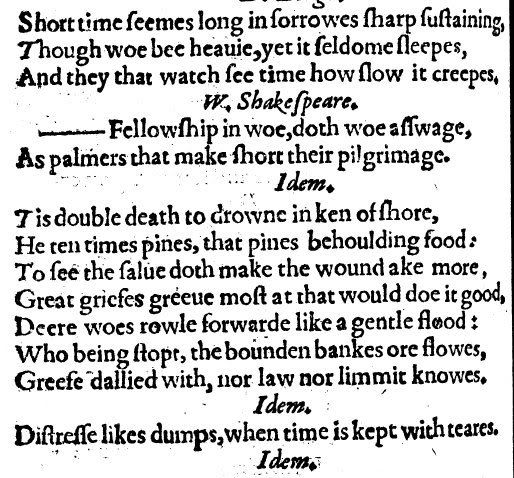
Lucrece, ll. 1624-6, 841-42, 1165-71, 1178
Women
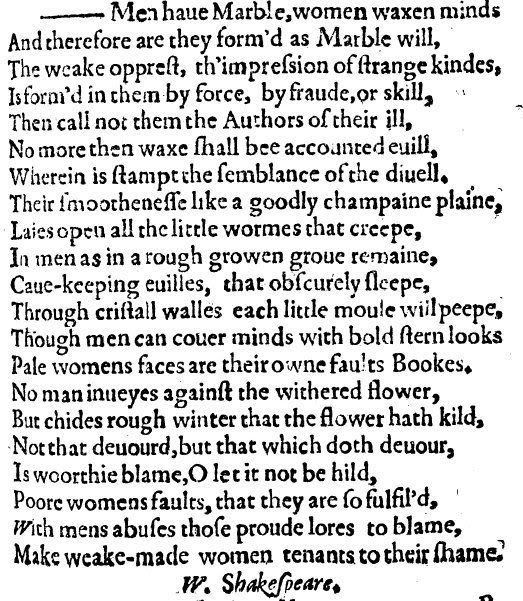
Lucrece ll. 1291-1311

Romeo and Juliet TLN 1140 (Friar Laurence)
Words
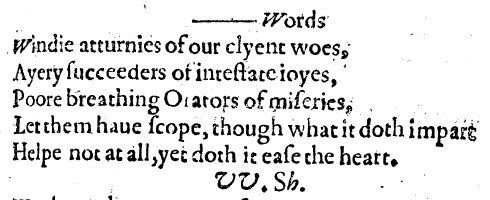
Richard III TLN 2922-27 (Elizabeth, with a cue from the Duchess of York)
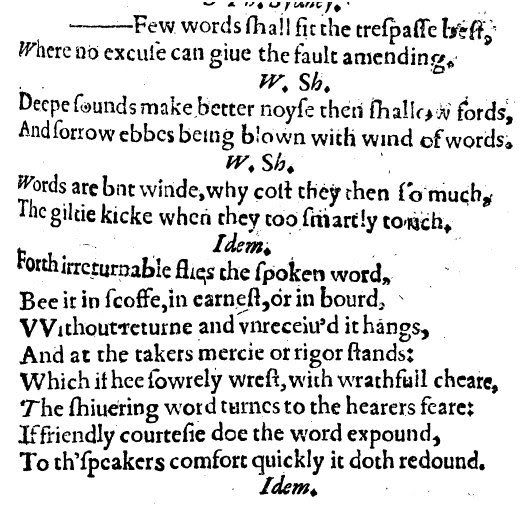
Lucrece ll. 1664-65, 1381-82, and two more I can't find.
THE HOURS OF THE NATURAL DAY
Diliculum

Romeo and Juliet TLN 2106-07 (Romeo); Venus and Adonis ll. 857-62
Mane

Lucrece 1132-34

Romeo and Juliet TLN 1059-62 (Friar Laurence -- or Romeo, depending on which edition you're using)
POETICAL DESCRIPTIONS
Of Albion.
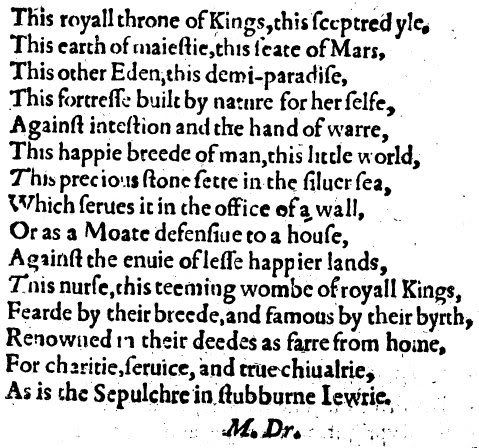
Richard II TLN 722-31 and 733-37 (John of Gaunt)
Note the misattribution to Michael Drayton! Also note that perhaps the most famous line ("this blessed plot, this earth, this realm, this England") is omitted.
Of August.

Can't find this one either.
Of an Horse
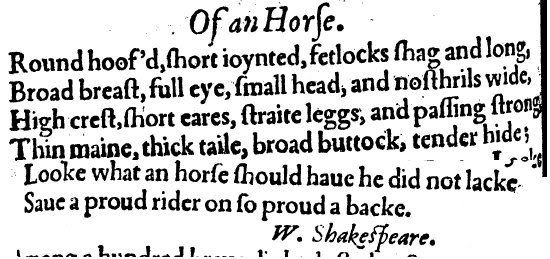
Venus and Adonis ll. 315-20
Descriptions of Beauty and Personage.
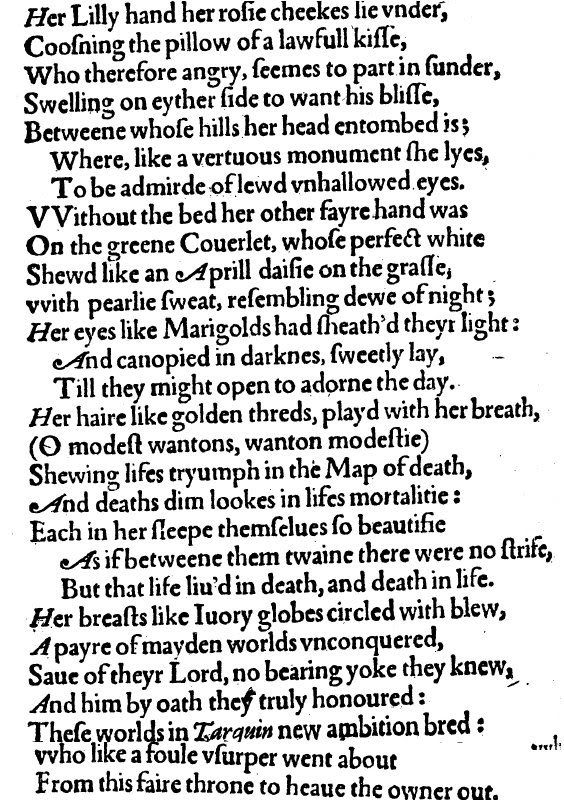
Lucrece ll. 437-64
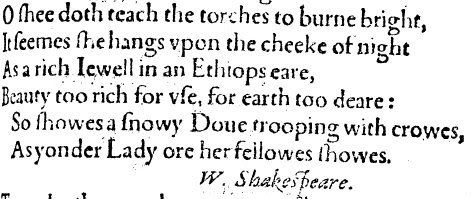
Romeo and Juliet TLN 666-71 (Romeo)
POETICAL COMPARISONS
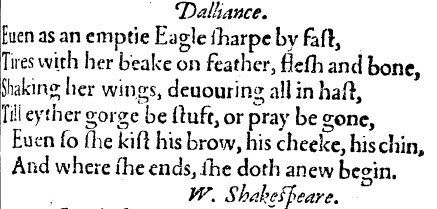
Venus and Adonis ll. 75-80
Fear
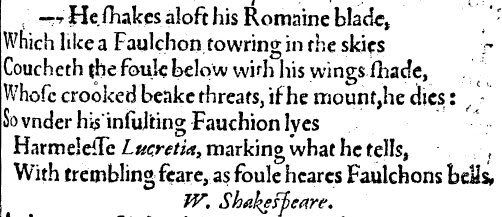
Lucrece ll. 556-62
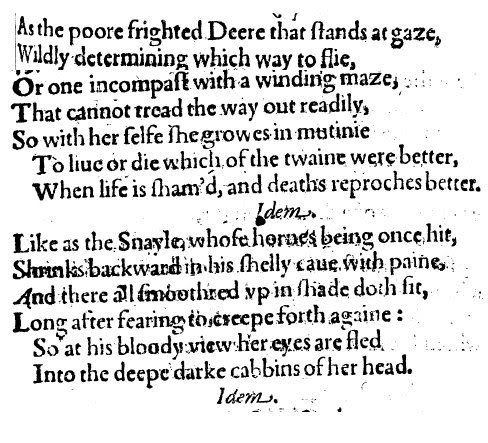
Lucrece ll. 1200-06; Venus and Adonis ll. 1055-60
NB: the final line of the Lucrece quotation should read "death's debtor"
Hope
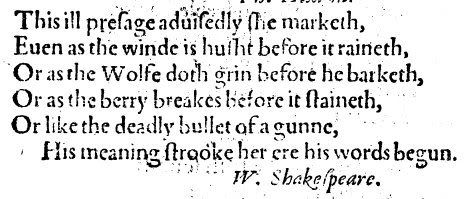
Venus and Adonis ll. 478-83
Love

Lucrece ll. 423-26
Night
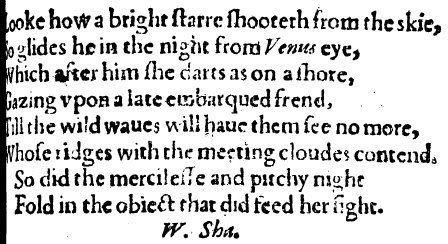
Venus and Adonis ll. 837-44
Sorrow
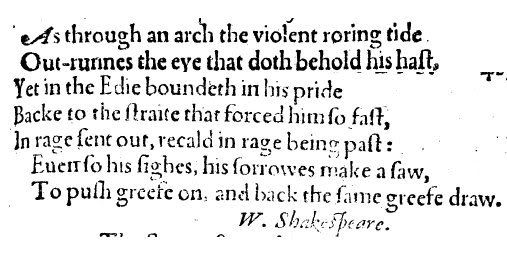
Lucrece ll. 1718-24
1. Twelve of Shakespeare plays had been printed in some form by 1600. The First Part of the Contention and The True Tragedy of Richard Duke of York, which have an unclear relationship to the "final" version of 2 and 3 Henry VI as published in the 1623 Folio, were printed in 1594 and 95 respectively; Love's Labour's Lost was published in 1598 with Shakespeare's name, famously, on the title page, the first time this had occurred; Richard III, Titus Andronicus, Romeo and Juliet, and 1 Henry IV had all gone through two editions (including one "bad" quarto -- a term which is being re-evaluated by textual critics but nevertheless a convenient shorthand, hence the quotation marks -- in the case of Romeo and Juliet), and Richard II had gone through three. A Midsummer Night's Dream, The Merchant of Venice, 2 Henry IV, Henry V (another "bad" quarto), and Much Ado About Nothing were all published in 1600, but England's Parnassus may already have been in the press by the time they appeared. It is suggestive that the anthology contains no quotations from A Midsummer Night's Dream, for instance, when the other plays written at about the same time (Romeo and Juliet and Richard II) are the best-represented of Shakespeare's dramatic output. [Back to top]
The following images are from England's Parnassus, a book of quotations published in 1600. According to EEBO the compiler's name is Robert Abbott, whom I assume is the "R.A." who signs off on the commendatory verse below. It's very interesting as a look at what sorts of things were Good Poetry from an Elizabethan POV, or at least one guy's POV. The most-represented poet as far as I could tell was Spenser, perhaps unsurprisingly, and there was also a very large showing from historically-minded poets like Michael Drayton and Samuel Daniel (my Sekrit Elizabethan Poet Boyfriend), and a lot from Joshua Sylvester and William Warner, whom you probably don't know much about unless you are a specialist.
Shakespeare, not surprisingly, is also well-represented, although what might be surprising, if I hadn't given it away in my previous post, is that nearly everything here comes from the narrative poems The Rape of Lucrece and Venus and Adonis. There are only five plays represented; roughly in order of number of appearances, they are Romeo and Juliet, Richard II, Richard III, 1 Henry IV, and Love's Labour's Lost. I am not sure how much of this is the result of privileging of narrative poetry over drama, and how much is a consequence of availability of printed texts.1 (It is notable that none of Shakespeare's sonnets, which weren't published until 1609, are quoted in England's Parnassus.)
Anyway, I am presenting to you all of the quotes attributed to Shakespeare in this collection (a few of which don't seem to actually be his), along with a couple of quotes by him but attributed to other people. (Weirdly, they're both from Richard II.) I've included the source of the quotations, along with the name of the speaker for quotes from the plays.


Angels

Richard II TLN 1469-70 (Richard)
Audacity

Venus and Adonis ll. 588-91
Avarice

The Rape of Lucrece ll. 185-91
Beauty

Lucrece l. 139; 80-81
Care

Romeo and Juliet TLN 1096 (Friar Laurence)
Danger

Venus and Adonis, l. 712
Death

Richard II TLN 687-96 (John of Gaunt)
Delay

Richard III TLN 2783-84 (Richard)

I can't find a source for this; it may be a misattribution. There are a few of them in the anthology, as you will see.
Fear

Lucrece ll. 280-82
Gentleness

I can't find a source for this one either.
Gluttony

Love's Labour's Lost TLN 28-29 (Longaville)
Good Name

Richard II TLN 182-84 (Mowbray)
NB: All authoritative texts read "gilded loam."
Grief

Venus and Adonis ll. 1029-30

Venus and Adonis ll. 351-56

Romeo and Juliet TLN 2176-77 (Lady Capulet)

Lucrece l. 385
Haste

Another one I can't find.
Hope

Richard III TLN 3451-52 (Richmond)
Jealousy

Venus and Adonis ll. 670-77
Justice

Lucrece l. 1738
Kings

Lucrece ll. 1065-66

Richard II TLN 1462-65 (Richard)

Lucrece ll. 658-60
Love

Venus and Adonis ll. 815-20

Venus and Adonis ll. 169-70

Romeo and Juliet TLN 217-21 (Romeo)

Romeo and Juliet TLN 200-05 (Romeo)

Two more I can't find.

Venus and Adonis, l. 43

Venus and Adonis, l. 1007-12; Romeo and Juliet TLN 1014-15 (Romeo); Venus and Adonis l. 736

Romeo and Juliet TLN 1469-73 (Friar Laurence)

Lucrece l. 406

Lucrece l. 321; Venus and Adonis ll. 427-28

I can't find this one either.

Venus and Adonis ll. 594-97, 864-68; Romeo and Juliet TLN 1476-78 (Friar Laurence)
Lust

Venus and Adonis ll. 821-26

Lucrece ll. 752-58
Mercy

Lucrece l. 646; Romeo and Juliet TLN 1716 (Prince Escalus)
Misery

Venus and Adonis ll. 729-30
Nature

Lucrece ll. 589-90
Opportunity

Lucrece ll. 927-33
Pleasure

Love's Labour's Lost TLN 1724-25 (Berowne)
Princes

Richard III TLN 911-16 (Brakenbury)
Sorrow

Richard III TLN 909-10 (Brakenbury)

Richard II TLN 593-4 (John of Gaunt)
Note the misattribution to Edmund Spenser!
Tears

Lucrece l. 611
Thoughts

1 Henry IV TLN 3044-46 (Hotspur); Lucrece l. 404

Lucrece l. 139
Time

Lucrece ll. 976-80
NB: the first line should read "ugly night."

Lucrece ll. 990-1010
Treason

1 Henry IV TLN 2779-81 (Worcester)
Use

Venus and Adonis ll. 789-90
Virtue

Romeo and Juliet TLN 1079-80 (Friar Laurence)

Lucrece ll. 923-26
Woe

Lucrece, ll. 1624-6, 841-42, 1165-71, 1178
Women

Lucrece ll. 1291-1311

Romeo and Juliet TLN 1140 (Friar Laurence)
Words

Richard III TLN 2922-27 (Elizabeth, with a cue from the Duchess of York)

Lucrece ll. 1664-65, 1381-82, and two more I can't find.
THE HOURS OF THE NATURAL DAY
Diliculum

Romeo and Juliet TLN 2106-07 (Romeo); Venus and Adonis ll. 857-62
Mane

Lucrece 1132-34

Romeo and Juliet TLN 1059-62 (Friar Laurence -- or Romeo, depending on which edition you're using)
POETICAL DESCRIPTIONS
Of Albion.

Richard II TLN 722-31 and 733-37 (John of Gaunt)
Note the misattribution to Michael Drayton! Also note that perhaps the most famous line ("this blessed plot, this earth, this realm, this England") is omitted.
Of August.

Can't find this one either.
Of an Horse

Venus and Adonis ll. 315-20
Descriptions of Beauty and Personage.

Lucrece ll. 437-64

Romeo and Juliet TLN 666-71 (Romeo)
POETICAL COMPARISONS

Venus and Adonis ll. 75-80
Fear

Lucrece ll. 556-62

Lucrece ll. 1200-06; Venus and Adonis ll. 1055-60
NB: the final line of the Lucrece quotation should read "death's debtor"
Hope

Venus and Adonis ll. 478-83
Love

Lucrece ll. 423-26
Night

Venus and Adonis ll. 837-44
Sorrow

Lucrece ll. 1718-24
1. Twelve of Shakespeare plays had been printed in some form by 1600. The First Part of the Contention and The True Tragedy of Richard Duke of York, which have an unclear relationship to the "final" version of 2 and 3 Henry VI as published in the 1623 Folio, were printed in 1594 and 95 respectively; Love's Labour's Lost was published in 1598 with Shakespeare's name, famously, on the title page, the first time this had occurred; Richard III, Titus Andronicus, Romeo and Juliet, and 1 Henry IV had all gone through two editions (including one "bad" quarto -- a term which is being re-evaluated by textual critics but nevertheless a convenient shorthand, hence the quotation marks -- in the case of Romeo and Juliet), and Richard II had gone through three. A Midsummer Night's Dream, The Merchant of Venice, 2 Henry IV, Henry V (another "bad" quarto), and Much Ado About Nothing were all published in 1600, but England's Parnassus may already have been in the press by the time they appeared. It is suggestive that the anthology contains no quotations from A Midsummer Night's Dream, for instance, when the other plays written at about the same time (Romeo and Juliet and Richard II) are the best-represented of Shakespeare's dramatic output. [Back to top]